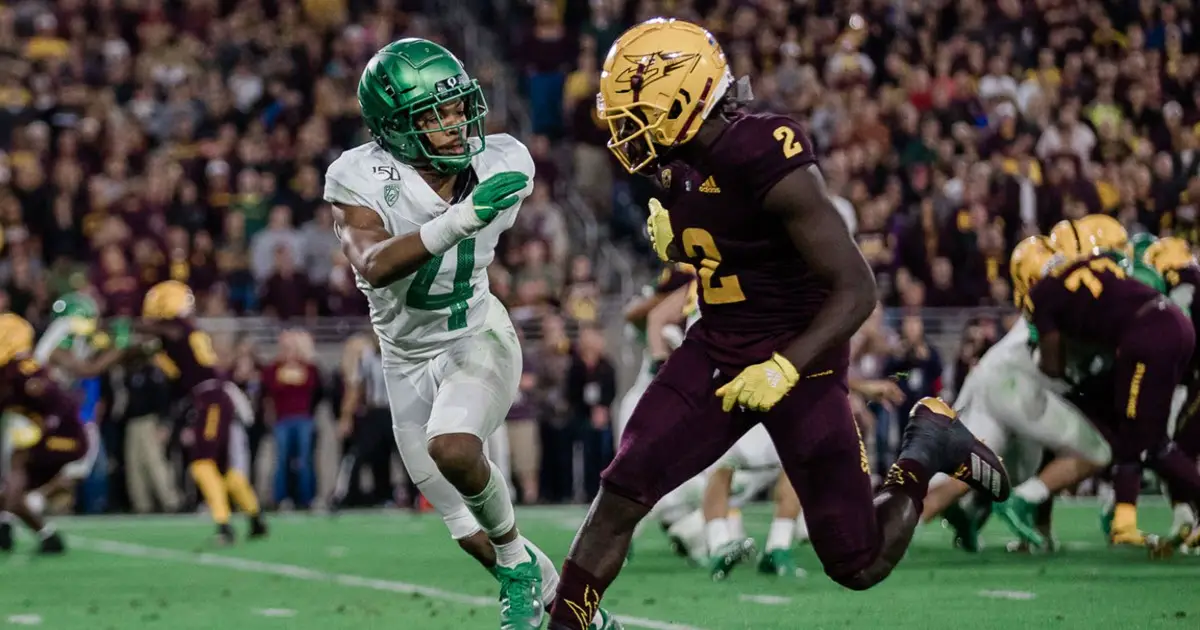If you didn’t know Oregon routinely goes 1-11 in Pac-12 Network replays, you aren’t watching the same Pac-12 Network and its drive to preserve revisionist history that I’m seeing.
I haven’t bothered to talk to anyone at “everybody’s” sports network, but it appears that they are rotating prime time by school; that is, Monday might be ASU night, followed by Utah on Tuesday, the Beavs on Wednesday, etc.
No problem so far…
BUT…the highlighted team always gets to win, generally three or four times a night. And here’s where Oregon comes out on the short end. It makes sense that the Pac-12 Network would select the highlighted team’s most impressive wins. This leads to the question: which team in the conference is it most impressive to win against? Here’s a hint. It’s the team that — in football — has a winning record against every conference opponent in games held since 1994.
So, for eleven teams in the league, that rare win against Oregon has to make the list of summer-prime-time-nothing-happening-in-the-sports-world replays.
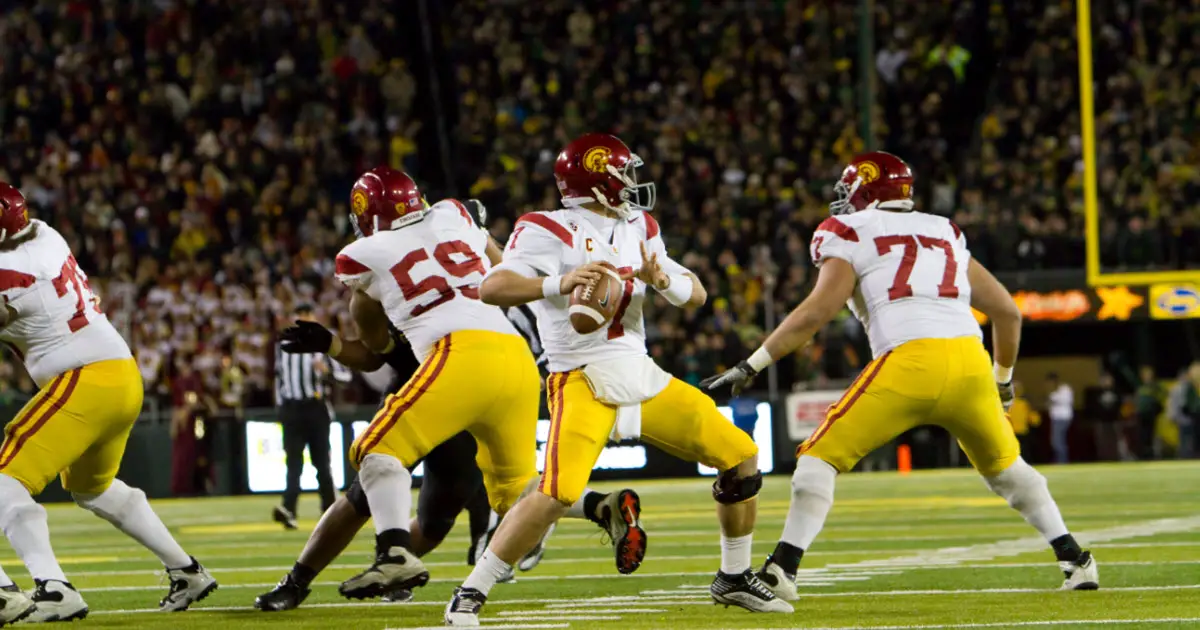
Matt Barkley and the Trojans beat the Ducks back in 2011…so what?
I’m writing this on Friday, June 12, and so far this week, I’ve noticed that Oregon has lost to Utah, Oregon State and Arizona State (twice, football and women’s basketball). It’s USC night tonight, and the Ducks are about to lose a 2011 heart-breaker, 38-35.
Yay! Now it’s Sunday, and it’s Oregon’s turn (after bowing to wall-to-wall gymnastics on Saturday). Unfortunately, though, the Pac-12 Network Gods don’t have much in the way of sunshine for the hapless Ducks. They present one Oregon win each in men’s and women’s basketball and only bother to present one win (against the Beavers) in football. To make matters worse, all three games are shown in the afternoon, deftly avoiding prime time, where more people might come to the conclusion that the Ducks are actually capable of winning a football game.
And now it’s Monday again, and it’s Colorado day. We get Neuheisel’s fake punt when the 1998 Hula Bowl game was already over, a 51-43 Ducks loss. Of course this happened before Colorado joined the Pac-12, but it shows the lengths to which the Pac-12 Network will go to make everybody else in the conference look good — at Oregon’s expense. Not that faking a punt when the game is in the bag is necessarily a “good look.”
I also have to question the value of providing a piece of evidence that Colorado might have been better when they were in the Big-12, but I suppose that’s getting picky.
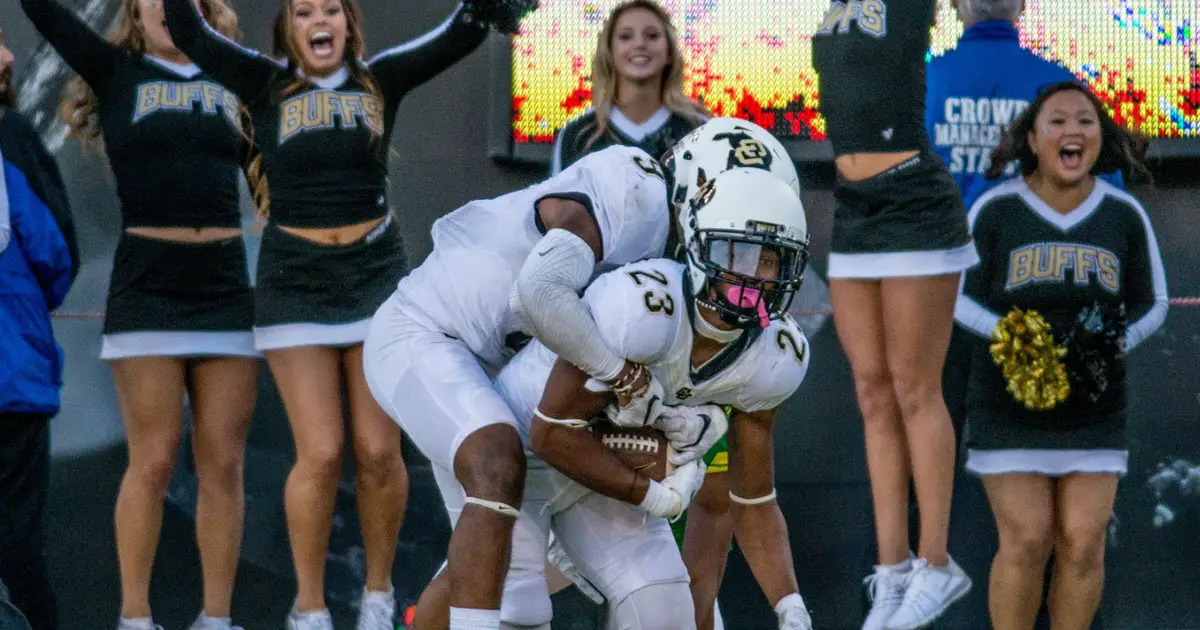
Oh Goody. We get to watch Dakota Prukop’s game-losing interception again…
But back to Monday! Now it’s 9:30 p.m., and Colorado is in the process of taking down the Ducks again, this time in 2016 at Autzen. A week has passed since I noticed that Oregon virtually always loses on the Pac-12 Network, and the Ducks have more losses to Colorado today than they’ve had wins over everybody during the past week combined?
I understand the concept of equal treatment, that all teams should have the same opportunity to show off their greatest games. And fans of every team like to see their team win, so if you’re going to program around the concept that this is Arizona night, Arizona fans are going to most enjoy watching Arizona win. They will especially enjoy watching Arizona beat the Ducks, which is a rare treat for pretty much anyone in the conference, save the Ducks.
But wait a minute here!
Equal time is one thing. But shouldn’t equal number of wins be, well, sort of, won? Is the Pac-12 Network nothing more than a participation award? Isn’t this supposed to be the “Conference of Champions”? If so, how do we treat our champions?
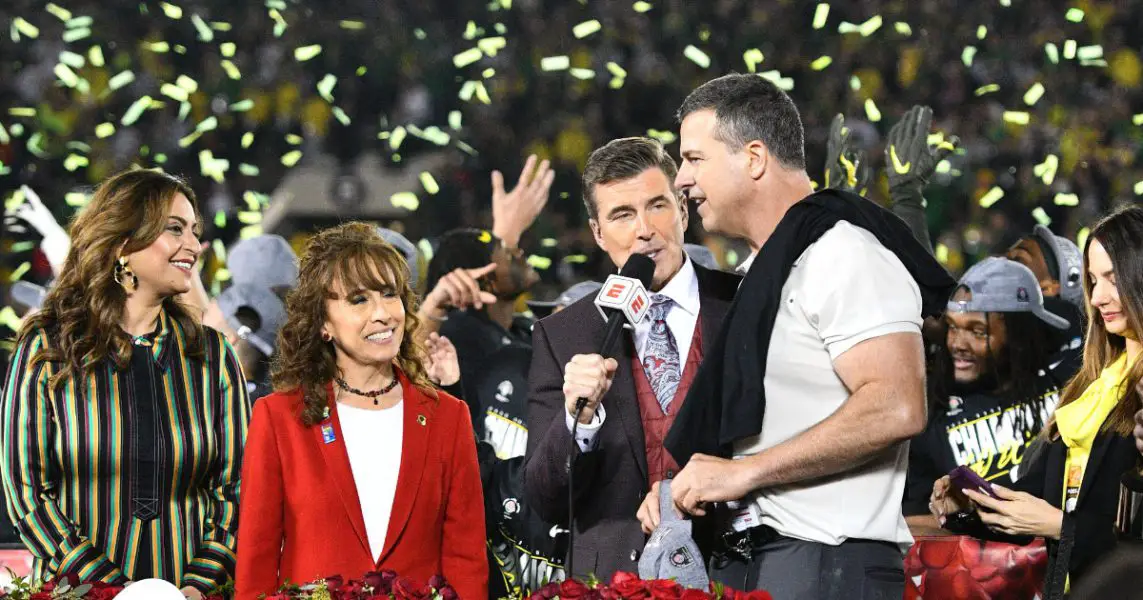
Does the Pac-12 Network have a grudge against their own champion?
Well, we show them losing eleven days out of twelve, of course – sometimes twice in the same day. Doesn’t everybody?
I hope not. And I think it’s a tremendous blunder by the marketing and programming departments on at least three levels. First, it presents the case that every team in the conference is pretty much the same except for Oregon, which seems to lose pretty much every night. This just isn’t the way it is. And why would anybody think it’s a good idea to constantly throw water on the fire of the conference’s (and potentially the Network’s) most fervent fans?
Second, it seems to define its market as “Beaver fans,” or whatever, on any given night. This is all fine and good for Corvallis, but who else cares? It’s a tiny, tiny niche. What’s more, I never know when it’s going to be Oregon night (if it ever is), so there’s a good chance I’ll miss it. And I’m really not interested in the 2011 loss to USC or watching the 1998 model of Rick Neuheisel gloating on the sideline.
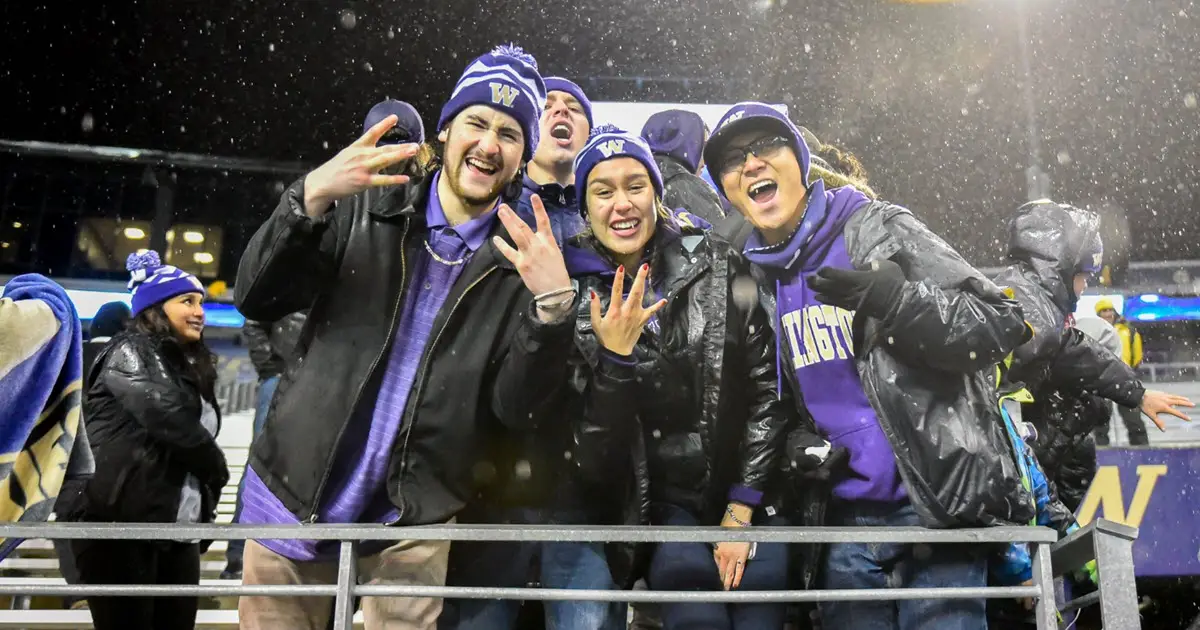
There are only two Husky wins over the Ducks in the last 16 years…guess which games we see on the Pac-12 Network?
Mass-marketing genius does not include the concepts of “We’ve got just what you want, so good luck finding it,” or “We’ve got exactly what a very small group of people want,” or “What can we do to drive away our most fervent fans?”
Third, it’s just plain lazy programming. For the most part, little or no context is given for the games. The drama of historical perspective, if any, isn’t addressed. And things bounce around: 2015, 2011, 2019, 1998 — whatever it takes, as long as the team of the night always wins. And that’s just the problem. The programming is designed around the concept that the conference just takes turns winning, most often at Oregon’s expense. That is revisionist history, because it selects and reshuffles events in a blatant attempt to misrepresent reality.
Here’s a memo to the Pac-12 Network scheduling Gods: Oregon is the flagship of Pac-12 in football and a program that generates national interest. As in, people nationally might have some interest in seeing how the Ducks play on anything besides their worst days.
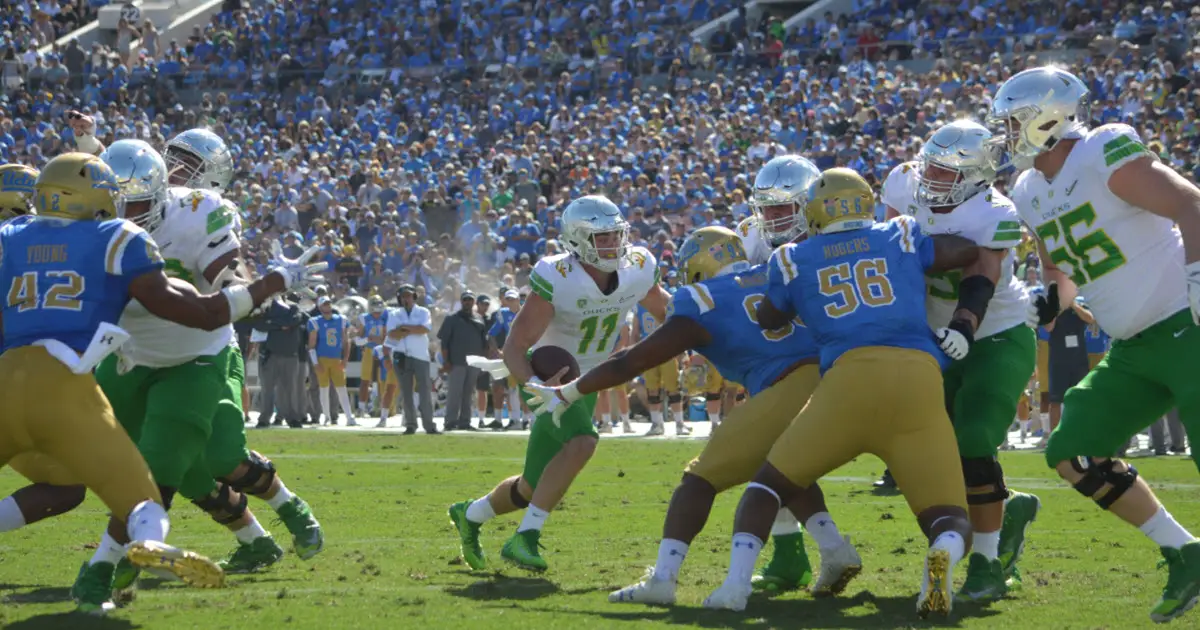
UCLA fans love to watch their 2017 win over No. 11 Braxton Burmeister and the Ducks.
You’d think the Network Scheduling Gods could see this one. But instead of celebrating Oregon’s success, the “Conference of Champions” Network recognizes Oregon’s achievement and national appeal by repeatedly sending the Ducks to the media woodshed, giving the Ducks repeat eleven-game (or worse) losing streaks – just one game after another that makes you sorry you even checked the guide.
Can’t the marketing geniuses figure out that “national interest” involves more television sets than Corvallis on one night and Tucson the next?
Or gymnastics all day and night on Saturday? At a time when the conference is struggling to develop its national reputation?
And they wonder why they can’t make a deal with DIRECTV?
Mike Merrell
Sandpoint, Idaho
Top Photo by Irina Filenko

Phil Anderson, the FishDuck.com Volunteer editor for this article, is a trial lawyer in Bend Oregon.
Related Articles:
Oregon Football: Early 2026 Ranking Projections
FishDuck Foaming Over Upside of 2026 Diamond Ducks
Unbelievable...Same SEC Stuff, Different Day
Why Oregon Football Always Belongs in the National Conversation
The B1G Won the 2026 Coaching Carousel...Big-Time!
Continuity? Lanning's Hiring Success is Put to the Test
Mike (Editor-in-Chief) is a 1970 graduate of the University of Oregon where he attended the Honors College and received all-conference honors as a swimmer. After college, Mike ran for the Oregon Track Club and narrowly missed qualifying for the US Olympic Trials in the marathon. He continues his involvement in sports with near-daily swimming or running workouts, occasional masters swim competition (where he has received two Top-10 World rankings), providing volunteer coaching to local triathletes and helping out with FishDuck.com.
Mike lives on 28 acres in the forest near Sandpoint, Idaho, where he has served as a certified public accountant for most of his working career. His current night job is writing novels about Abby Westminster, the only known illegitimate daughter of Britain’s finest secret agent who has to bring down arch-villains plotting dastardly deeds. And, yes, Abby is also a DUCK!

